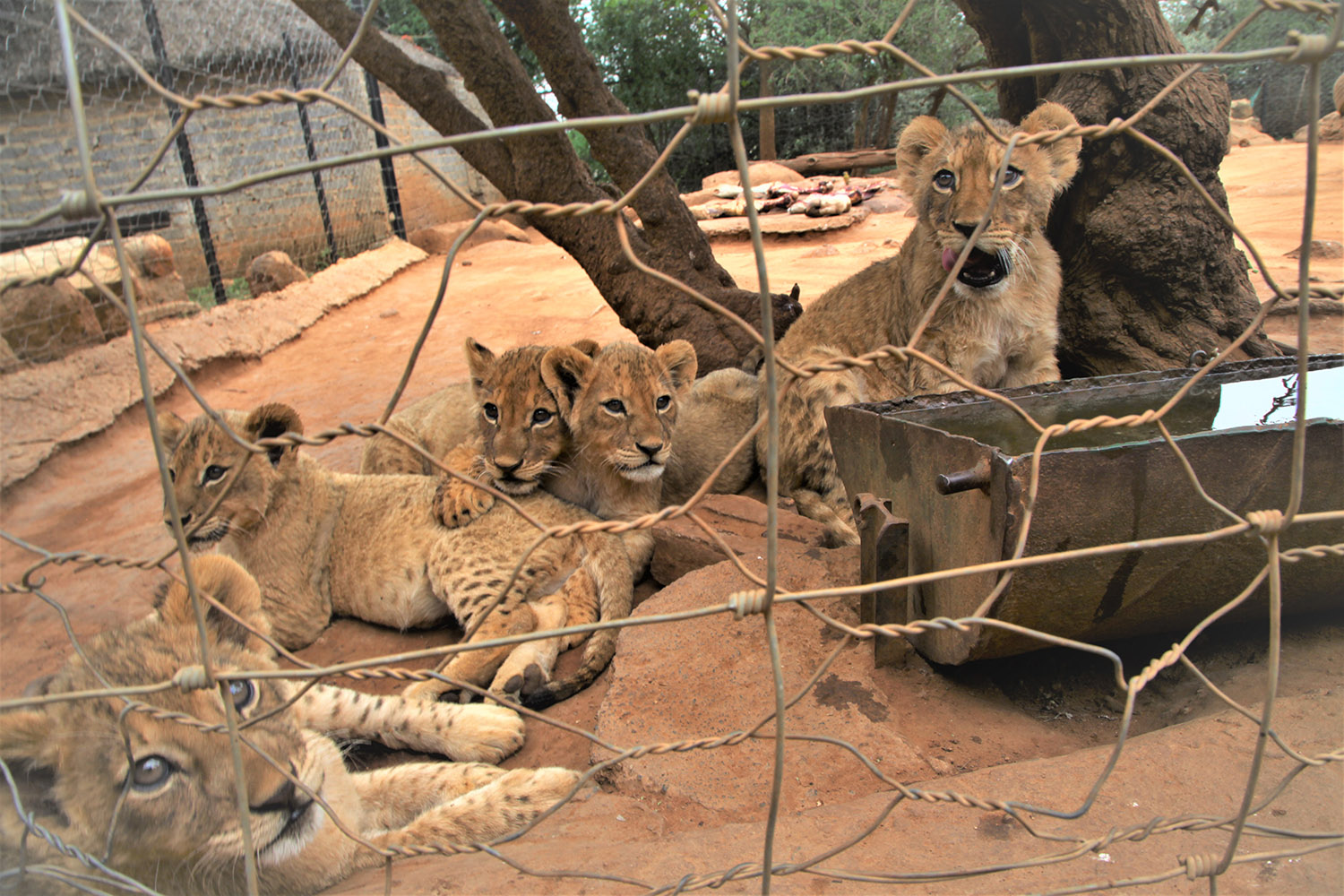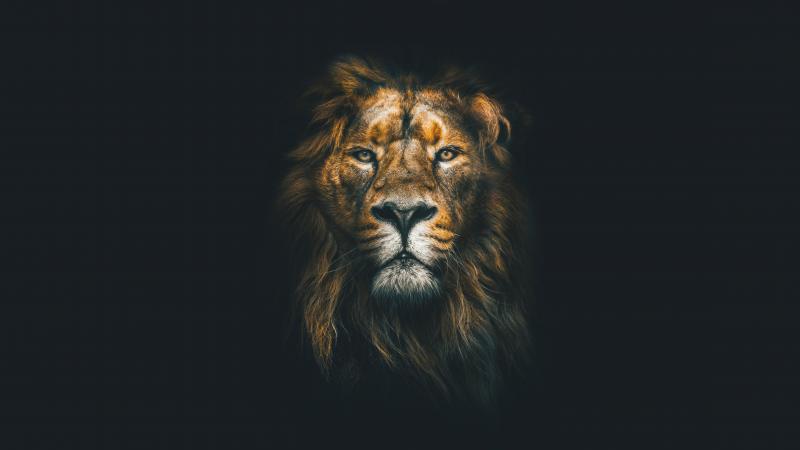En Afrique du Sud, les grands félins sont élevés à des fins de commerce international. Le pays occupe la première place mondiale en tant qu'exportateur de félins vivants, mais également de leurs parties. L'inefficacité et la fragmentation des réglementations nationales ont permis l'émergence d'une industrie des grands félins échappant à tout contrôle.
On estime que plus de 10 000 lions vivent actuellement dans des fermes sud-africaines. Selon des chiffres récents du gouvernement, le pays abrite également plus de 600 tigres, espèce non indigène, bien que ce nombre soit difficile à confirmer en l'absence d'obligation de recensement des populations, les naissances, les décès ou les déplacements des tigres. Les léopards et les jaguars sont eux aussi élevés à des fins commerciales dans les mêmes fermes que les lions et les tigres, et font l'objet d'un commerce international, qu'il s'agisse d'animaux vivants ou de leurs parties. Ces grands félins sont exploités pour le tourisme, notamment à travers des activités telles que les caresses aux petits ou les promenades avec eux, avant d'être destinés à la chasse aux trophées, ainsi qu'au commerce d'animaux vivants et de leurs parties.
Le pays fournit des grands félins et des parties de leurs corps aux pays asiatiques, dont certains constituent des centres névralgiques de la demande pour les parties de grands félins, utilisées dans les médecines traditionnelles et perçues comme des articles de luxe. La demande de produits dérivés du tigre constitue une menace pour la quasi-totalité des grands félins, car il est difficile de différencier les parties d’une espèce à l’autre. Cette demande alimente le braconnage et le trafic. En encourageant et en intensifiant la demande des consommateurs et en contribuant au commerce illégal, l'industrie sud-africaine des grands félins en captivité compromet les efforts de conservation et d'application de la loi en Afrique du Sud et à l’échelle mondiale.
En mars 2024, le cabinet sud-africain a approuvé une position de principe visant à mettre fin à la détention de lions en captivité à des fins commerciales et à fermer les installations d'élevage de lions en captivité. Peu après, un rapport du groupe de travail ministériel a recommandé des pistes de sortie volontaire pour les acteurs de l'industrie des lions en captivité et a suggéré d'inclure d'autres grands prédateurs dans le plan d'élimination progressive. Mais on ne sait toujours pas si et comment les recommandations seront mises en œuvre et il reste encore du travail à faire pour protéger toutes les espèces de grands félins.
Un rapport du réseau QUATRE PATTES établi en 2024 présente les recommandations suivantes pour éliminer progressivement cette industrie :
- L' Afrique du Sud doit interdire tout commerce de grands félins, de leurs parties et de produits dérivés au sein, en provenance et à destination du pays ;
- L' Afrique du Sud doit mettre fin à la détention en captivité de tous les grands félins à des fins commerciales, fermer les installations pour grands félins en captivité, mettre fin à l'élevage intensif de grands félins et mettre fin à l'exploitation commerciale des grands félins captifs ou élevés en captivité ;
- L' Afrique du Sud doit mettre en œuvre un plan d'arrêt progressif du commerce et de l’exploitation des grands félins avec pour objectif une fermeture complète des fermes d’élevage d'ici à 2030 ;
- L' Afrique du Sud doit mettre en œuvre toutes les décisions et résolutions pertinentes de la CITES relatives aux grands félins ;
- L' Afrique du Sud doit jouer un rôle de premier plan dans la défense de la protection des espèces de grands félins en proposant qu'elles bénéficient toutes du même niveau de protection dans le cadre de la CITES.
Le réseau QUATRE PATTES fait campagne pour interdire tout commerce de grands félins et de leurs parties en provenance, à destination et au sein du territoire sud-africain. Nous avons besoin de vous à nos côtés.
Rejoignez-nous en signant notre pétition pour nous aider à mettre fin au commerce des grands félins en Afrique du Sud.
Tous les grands félins doivent être protégés
L'Afrique du Sud a annoncé en 2021 son intention de mettre immédiatement un terme à la domestication et à l'exploitation des lions, et de fermer les centres de détention de lions en captivité. Bien qu'il s'agisse d'une déclaration encourageante de la part de la ministre sud-africaine de l'Environnement, Barbara Creecy, elle est loin d’être suffisante. En effet, d'autres espèces de grands félins, originaires d'Afrique du Sud ou d'ailleurs, sont également exploitées dans ce pays, et leurs populations sont menacées à travers le monde. Le commerce des grands félins est interconnecté. Le réseau QUATRE PATTES suit de près le processus législatif du ministère sud-africain de l'Environnement et plaide pour que toutes les espèces de grands félins soient inclues dans la nouvelle politique.
Une industrie en pleine expansion qui exploite les animaux sauvages les plus emblématiques du monde
L'exploitation des grands félins en Afrique du Sud ne cesse de croître. Les espèces indigènes comme les lions et les léopards, mais aussi les espèces exotiques comme les tigres et les jaguars, en sont victimes. On estime qu’environ 10 000 lions sont élevés en captivité dans toute l'Afrique du Sud. En ce qui concerne les tigres, le nombre exact est inconnu, mais il est estimé qu'il y en a plus de 600 à travers le pays. La demande de grands félins a conduit à leur élevage intensif et à leur commercialisation à grande échelle dans le monde entier:
• Légalement : Les grands félins peuvent être élevés en captivité et exploités à des fins lucratives (interactions, animaux de compagnie, chasse au trophée, divertissement
• Illégalement : L'Afrique du Sud alimente le commerce illégal en fournissant des animaux vivants à des fermes d'élevage en Asie et en échangeant des parties d'animaux pour des médicaments traditionnels.


